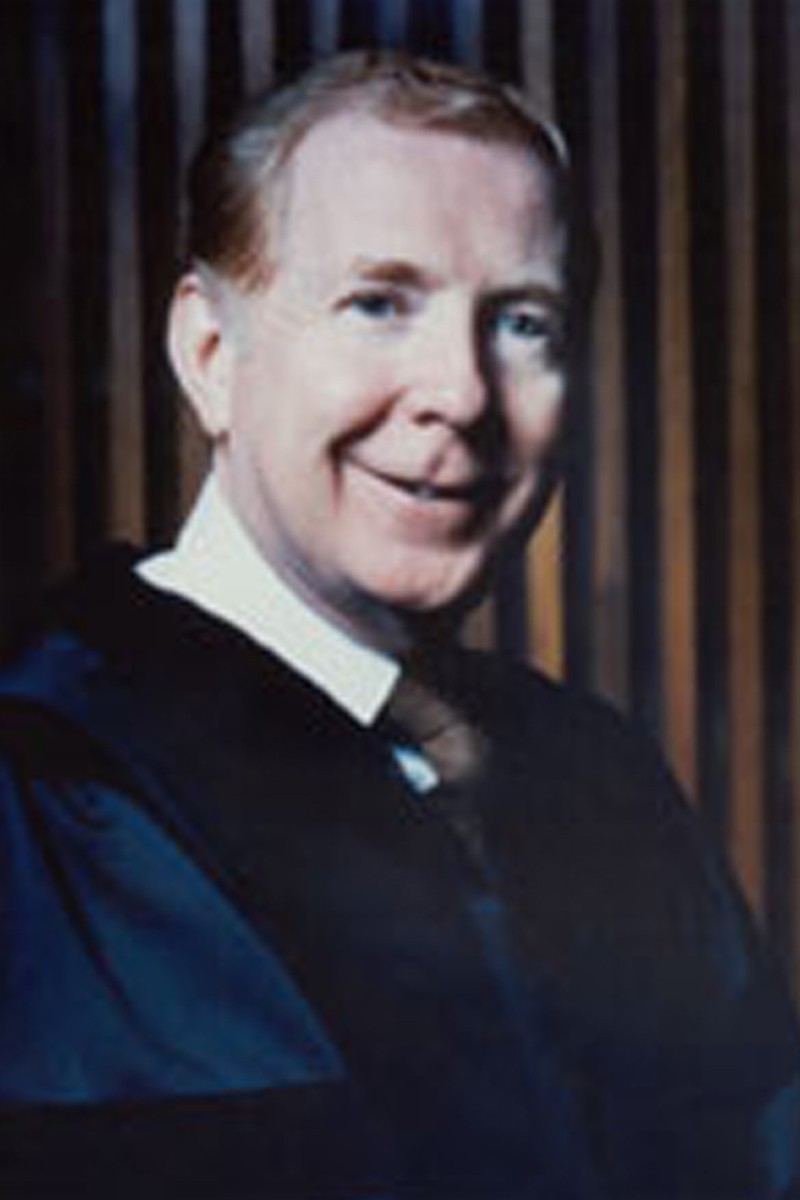Andrew (Andy) Grant Douglas
Andrew Grant Douglas was regarded by colleagues in the legal profession for his brilliant mind and for being hardworking, and well-prepared. He was elected and served as a justice on the Supreme Court of Ohio for three terms, from 1985 to 2002.
Justice Douglas, best known as “Andy,” was well known for his pocket constitution and his red pen. Douglas drafted most opinions longhand on a legal pad and is remembered as a skilled editor with the red pen. A labor-friendly Republican, who saw the law as a shield for the defenseless and a shelter for the vulnerable, Douglas was always mindful of the people of Ohio.
Justice Douglas was first elected to the Supreme Court in 1984, reelected in 1990 and 1996. His final term ended in 2002, when he reached the mandatory retirement age for judges set in the Ohio Constitution. During his time on the high court, he often served as a guest lecturer at Ohio universities and law schools. He was an adjunct professor at Ohio Dominican College from 1992 to 1995.
Justice Douglas wrote a total of 927 opinions for the Supreme Court: 355 majority opinions; 260 dissenting opinions, 226 concurring opinions and 86 which concurred in part and dissented in part.
Among the cases he authored, most prominent in his legacy are decisions in DeRolph v. State of Ohio, which ruled Ohio’s school funding system unconstitutional, in part because the reliance on property taxes creates inequities between property-rich and poor school districts; decisions that expanded First Amendment and press rights and the state’s open records laws; and decisions that advanced civil and individual rights, particularly for people in the minority.
In an interview with The Plain Dealer in December 2002, Douglas said his most meaningful case during his Supreme Court career was in 1987 with Dayton Power & Light Company v. Ohio Civil Rights Commission. A group of employees were engaged in “horseplay” and damaged company property. Of the employees involved, Samuel Prather was the only Black person and the only employee fired. The Supreme Court ruled that the company unlawfully discharged Prather. Douglas remarked, “Every case that comes here is important, but if I had to choose an example of moral persuasion of the Court and the ability to do the right thing, that’s it.”
In a 1997 commencement address to Cleveland State University Marshall College of Law, Justice Douglas explained his judicial philosophy:
“A simple rule can help you meet and exceed expectations. As you traverse the rocky terrain of the modern practice of law, always keep this principle in mind: Endeavor to give your clients advice which will advance their interests while also furthering the interests of justice. I can think of no greater comfort than laying down your head on your pillow each night, knowing that day you helped somebody. We, in our profession, can do that each and every day.”
Andy Douglas was born July 5, 1932, during the Great Depression in an impoverished neighborhood in Toledo, Ohio. His parents, Andrew and Elizabeth Douglas, were Scottish immigrants, his father a minister in the diverse neighborhood where they lived. He had four siblings. Throughout his life, Douglas never forgot his Toledo roots and was a champion for everyday people.
Douglas worked his way through the University of Toledo and served in the U.S. Army, advancing to the rank of first lieutenant. He went on to get his law degree from the College of Law at the University of Toledo in 1959. He joined the law firm of Eugene Winchester II and soon became a partner. He practiced law in Toledo and Lucas County for 20 years.
In 1961 in his first run for public office, he was one of the youngest elected to the Toledo City Council. Reelected for 10 consecutive two-year terms, Douglas earned the moniker, the “Dean.” Among his accomplishments were shepherding Toledo’s master plans for modern sewer and water facilities to expand distribution and provide flood relief, encouraging development of economically depressed areas of the city, and working with safety services unions.
As an attorney and a public official, Douglas was well-regarded for facilitating resolution when disputes arose.
“By incorporating all legitimate interests in legal and political disputes, he was able to resolve complex issues efficiently, saving the expense of lengthy litigation and inevitable hardening of positions,” said the late Robert Kaplan, a Toledo attorney.
In 1980, Douglas was elected to the 6th District Court of Appeals in Toledo. Sensitive to local criticism that he had not been a county judge, Douglas asked the chief justice of the Supreme Court to assign him as a visiting judge for common pleas courts in several counties. He also served as an adjunct faculty at the University of Toledo Community and Technical College.
After retiring from the bench, Douglas served on the board of directors of Block Communications, Inc., a diversified media company which owns the Blade, Buckeye Broadband, and Telesystem. He was a partner in the Columbus law firm Crabbe, Brown & James, taking clients and business cases and advising city government and local politicians. He served as counsel to the board of the Ohio Patrolmen’s Benevolent Association.
From 2004-2009, he served as executive director of the Ohio Civil Service Employees Association, a labor union representing state employees.
He later joined the Columbus office of the law firm Mazanec, Raskin & Ryder Co. where he practiced until his death in 2021 of pulmonary fibrosis.
Douglas was survived by his wife, Sue Pohlman Douglas, whom he married in 2010.
Douglas’ first wife, Joan Bowman Douglas, 33, died unexpectedly in 1966. They had four children: a daughter, Cynthia Reeves and sons Robert (Janet), Andrew "Chip," and David (Nora) Douglas. Douglas also had eight grandchildren and 10 great-grandchildren.

b. July 5, 1932
d. Sept. 23, 2021
139th Justice of the Supreme Court of Ohio
TERM
Jan 1, 1985
to Dec 31, 2002
